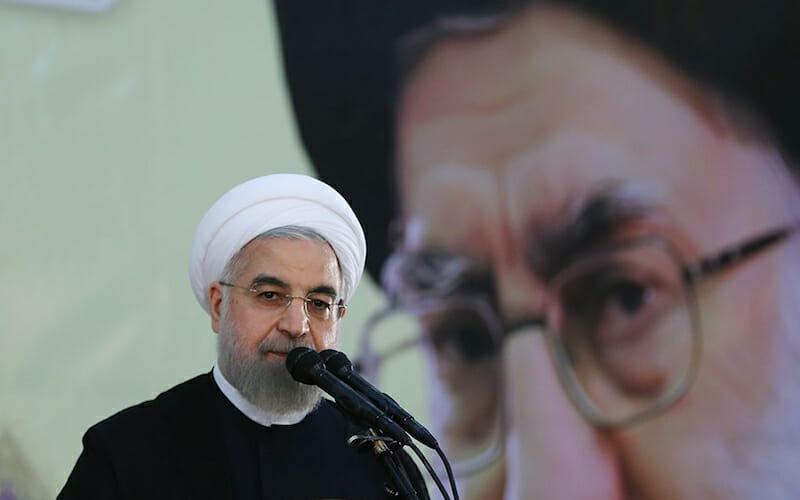
Playing Iran
Notwithstanding the entrenched animosity between bitter rivals Saudi Arabia and Iran, it is possible that Iranian regional ambitions could be curbed using the Iran nuclear deal (JPCOA) as both a carrot and a stick. Were that to happen, and Saudi fears about Iranian hegemony abated, at least somewhat, a surprising amount of progress could be achieved on many fronts in 2018.
The catalyst for this opportunity is the rolling series of protests that began in Iran’s second largest city Mashhad in late December 2017 and roiled the country for the better part of two weeks.
That the protests started in Mashhad, and not in Tehran, is of more than of passing interest. The city holds the burial site of one of Shi’ite Islam’s most revered Imams, Reza, and is also home to Ibrahim Raisi, a hardline conservative cleric who ran against President Hassan Rouhani in the May 2017 presidential election. Though he suffered a considerable loss, Raisi polled nearly 16 million votes, 38 percent of those cast and he remains a force to be reckoned with.
Some argue that the protests were initiated by Raisi’s supporters in Mashhad with the intention of targeting President Rouhani, but that things quickly slipped beyond their control. Young Iranians, frustrated by scarcity of jobs and angered by rising inflation caused by a tough austerity regimen, took to the streets in force. They denounced not only the government but also the religious elite and Ayatollah Khamenei himself.
The speed with which the protests spread across the country caught the authorities by surprise. It took several days, and the arrests of thousands, to quell the unrest. Predictably, the religious authorities and Ayatollah Khamenei blamed foreign elements, chiefly the Americans. The Ayatollah warned of severe retribution and labelled Donald Trump a “psychotic.”
President Rouhani took a different tack. Speaking on January 7, he argued, “It would be a misrepresentation and also an insult to the Iranian people to say they only had economic demands. People had economic, political and social demands.”
In doing so, he simultaneously acknowledged the complaints of the protesters while undercutting the hardliners. “People’s access should not permanently be restricted. We cannot be indifferent to people’s lives and business.”
Much of the anger that put protesters on the streets can be traced to the release of a draft budget on December 10. Though it called for funds devoted to job creation, it also laid bare the costs of Iran’s foreign interventions in Iraq and Syria and, even more significantly, the amount of money that was going to religious institutions. Ordinary Iranians bearing the brunt of austerity measures in a stagnant economy are aware of how corrupt many of those institutions have become. Seen from that perspective, the budget was a deft and calculated move by the president, one that was designed to draw fire toward his opponents.
For the time being, the hardliners are on the back foot, outmanoeuvred by a skilled politician who well knows just how important the nuclear deal is to his political survival. That hard reality, coupled with the protests, presents a tactical opportunity for Washington and Riyadh. The question is, will they play it effectively?
It has been said that Donald Trump knows how to deal with bullies like Kim Jong-Un with a simple rule of thumb: ensure that you are the bigger bully. And certainly his approach with Iran thus far has been to play that game. But he also likes to play the game of keeping people guessing, be they friend or foe.
President Trump, by continuing the sanctions waiver while still threatening to withdraw from the JCPOA, gives all sides breathing space without compromising any positions.
Both President Rouhani and the Saudis must direct funds away from costly military efforts. In Iran, the protests, which spread to some 80 cities, showed the depth of anger, particularly among young Iranians, who see that the removal of sanctions has failed to deliver promised economic benefits. The Saudi crown prince Mohammed bin Salman (MbS), in the throes of driving through the greatest economic transformation the kingdom has ever seen, has twice been forced to dip into the public purse, most recently on January 6. Cuts to subsidies and perks for public sector workers and the military have fueled deep resentment.
Wars drain state budgets and the longer they go on the greater the cost. For the Iranians, it is largely the Syrian front. For the Saudis and MbS, it is the Yemen conflict. When the Saudis first launched their aerial campaign over Yemen, they anticipated a quick victory. Nearly three years later, the war is at a stalemate with the Yemeni people brutally caught between the Houthis on the ground and the Saudi coalition in the air. Syria too, after nearly seven years of vicious conflict, is similarly stalemated with horrific consequences for the civilian population.
The outcome of a stalemate can be either the continued quest for military superiority by one side over the other or an acceptance that there will be no victory and that a negotiated settlement is the only way out. The latter requires give-and-take and an understanding that bitter pills will have to be swallowed by both sides.
For the Saudis (and the West) that means accepting that Bashar al-Assad will stay in power. For the Iranians it means abandoning their support of the Houthis and being required to accept a Yemen effectively divided between Saudi and Emirati spheres of influence in the north and south, respectively.
There is already a roadmap in place for the negotiated settlement scenario and it is Iraq. The Iraqis have used a rapprochement with Saudi Arabia to push back against undue Iranian influence. The Saudis for their part have used diplomacy and commercial agreements to encourage the process of weaning Baghdad away from Tehran.
But why would Iran accept what amounts to a blunting of its regional aspirations? That is where Trump comes in. To survive politically, Rouhani needs to show he is turning the country around economically. With rising unemployment and deepening poverty, he does not have much time to play with. An adroit and judicious use of the JCPOA as both carrot and stick, coupled with Trump’s mastery of keeping everyone guessing, creates space for Rouhani to deliver tangible economic gains to the Iranian people.
An Iran focussed on domestic issues will dial down Saudi anxiety over Iranian regional hegemony, as will an end to both the Syrian and Yemen wars. The two great regional powers embarking on economic transformation of their respective economies will benefit not just their own citizens but the wider region as well.
A pipedream scenario? Perhaps, but MbS, were he to learn lessons from the Yemen quagmire and other foreign policy adventures gone awry, could stake a serious claim to be the leader of the Arab world. Rouhani could strike a serious and perhaps lasting blow to his political foes. And though it is difficult to know from day to day, and self-inflicted crisis upon self-inflicted crisis, what goes on in Trump’s mind, he is hungry for a big win. Helping to shape an end to two ruinous wars while stabilizing a region now riven with sectarian tension would give him that. To quote the president, “Now that would be some deal.”
This article was originally posted in Gulf State Analytics.

